Ethical Evaluation of Facebook's Targeted Advertising Practices
VerifiedAdded on 2023/04/21
|7
|1943
|484
Essay
AI Summary
This essay critically examines the ethical dimensions of Facebook's practice of mining user data to target advertisements, particularly focusing on vulnerable users experiencing breakups. It employs four major ethical theories – utilitarianism, deontology, virtue ethics, and contract theory – to evaluate the morality of Facebook's actions. While utilitarianism could potentially justify the practice based on overall positive outcomes for businesses and some users, the essay argues that deontology, virtue ethics, and contract theory highlight the unethical nature of manipulating users' emotions without their consent for profit. The analysis reveals a conflict between Facebook's pursuit of profit and its responsibility to uphold user trust and ethical standards, ultimately recommending a more balanced approach that respects user privacy and autonomy while managing client relationships. Desklib provides a platform for students to access this and similar assignments for study purposes.
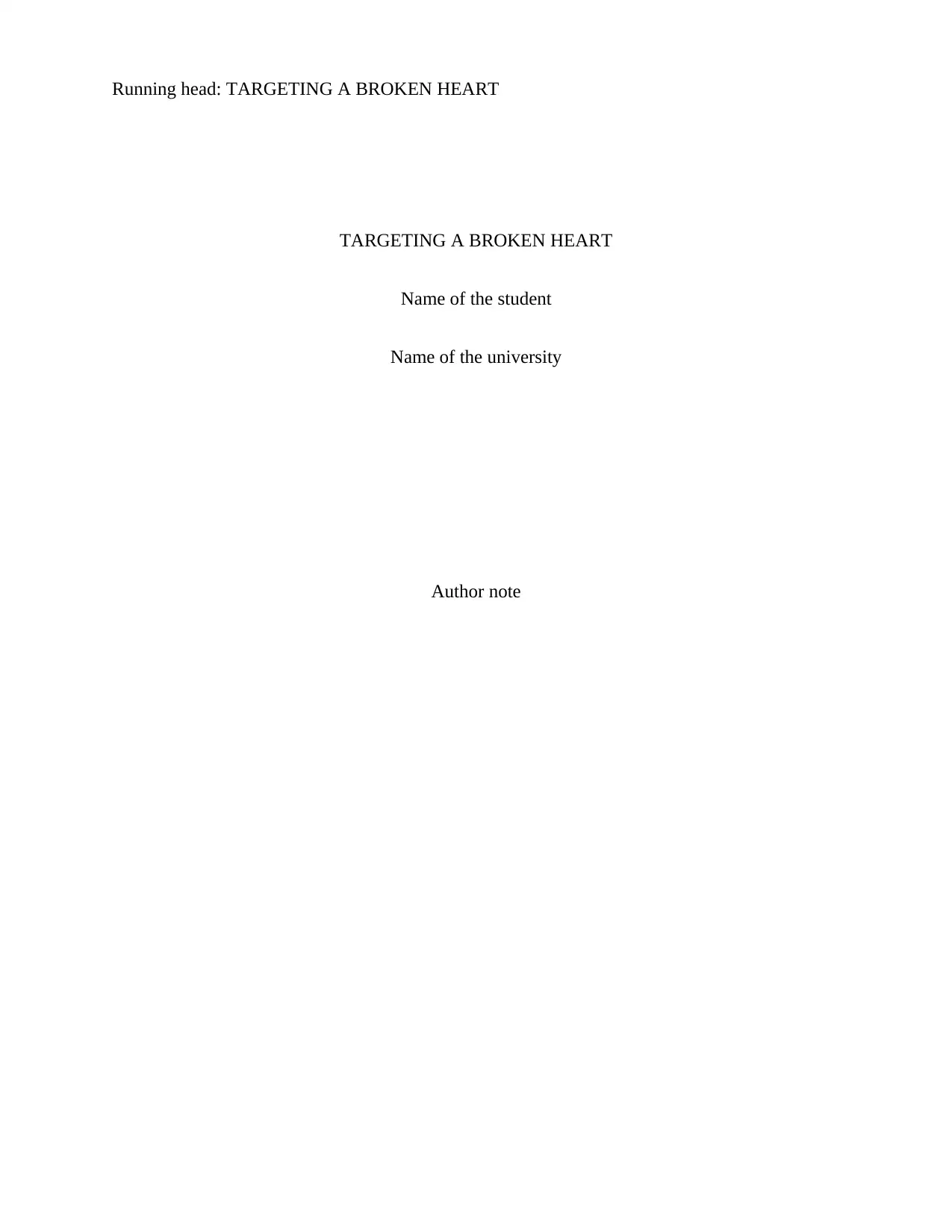
Running head: TARGETING A BROKEN HEART
TARGETING A BROKEN HEART
Name of the student
Name of the university
Author note
TARGETING A BROKEN HEART
Name of the student
Name of the university
Author note
Paraphrase This Document
Need a fresh take? Get an instant paraphrase of this document with our AI Paraphraser
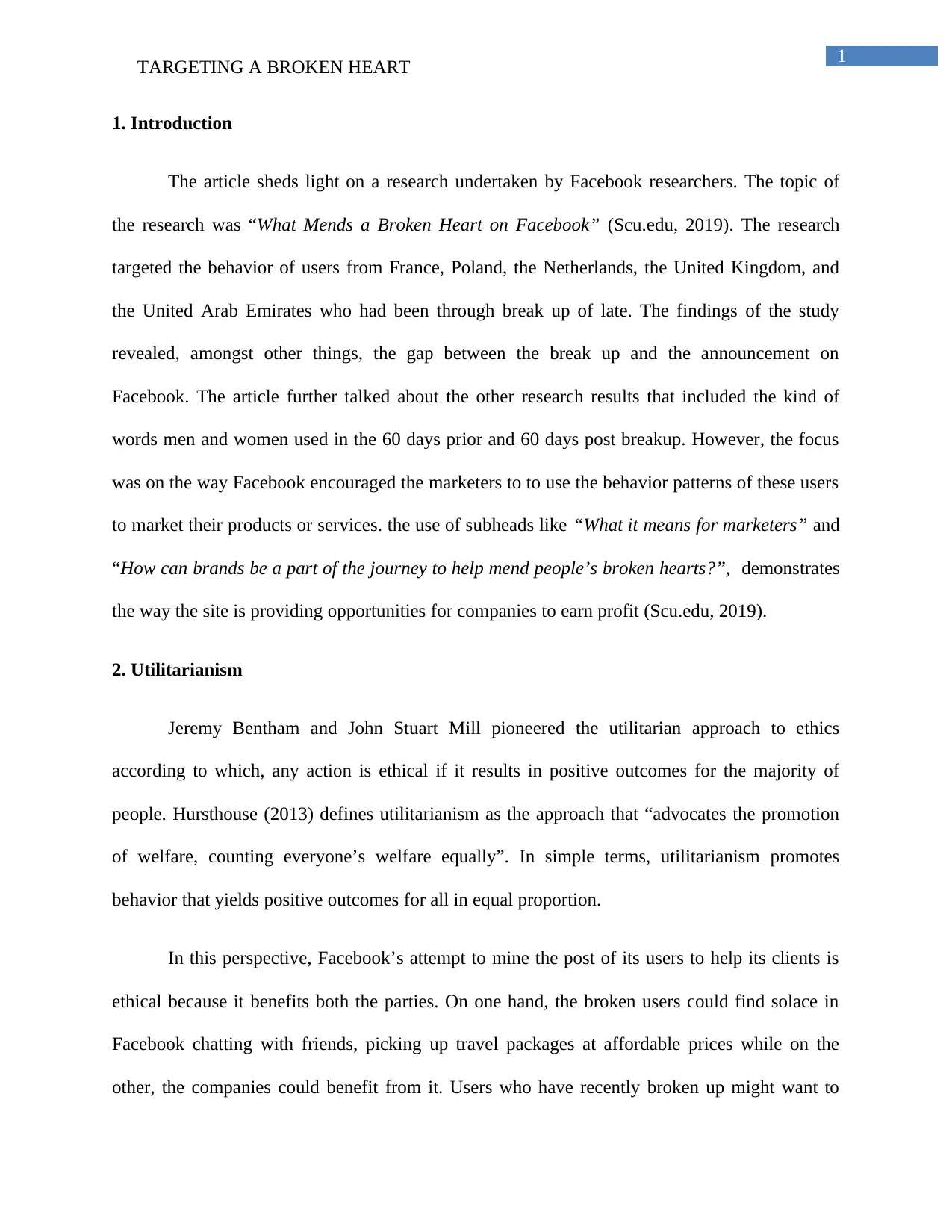
1
TARGETING A BROKEN HEART
1. Introduction
The article sheds light on a research undertaken by Facebook researchers. The topic of
the research was “What Mends a Broken Heart on Facebook” (Scu.edu, 2019). The research
targeted the behavior of users from France, Poland, the Netherlands, the United Kingdom, and
the United Arab Emirates who had been through break up of late. The findings of the study
revealed, amongst other things, the gap between the break up and the announcement on
Facebook. The article further talked about the other research results that included the kind of
words men and women used in the 60 days prior and 60 days post breakup. However, the focus
was on the way Facebook encouraged the marketers to to use the behavior patterns of these users
to market their products or services. the use of subheads like “What it means for marketers” and
“How can brands be a part of the journey to help mend people’s broken hearts?”, demonstrates
the way the site is providing opportunities for companies to earn profit (Scu.edu, 2019).
2. Utilitarianism
Jeremy Bentham and John Stuart Mill pioneered the utilitarian approach to ethics
according to which, any action is ethical if it results in positive outcomes for the majority of
people. Hursthouse (2013) defines utilitarianism as the approach that “advocates the promotion
of welfare, counting everyone’s welfare equally”. In simple terms, utilitarianism promotes
behavior that yields positive outcomes for all in equal proportion.
In this perspective, Facebook’s attempt to mine the post of its users to help its clients is
ethical because it benefits both the parties. On one hand, the broken users could find solace in
Facebook chatting with friends, picking up travel packages at affordable prices while on the
other, the companies could benefit from it. Users who have recently broken up might want to
TARGETING A BROKEN HEART
1. Introduction
The article sheds light on a research undertaken by Facebook researchers. The topic of
the research was “What Mends a Broken Heart on Facebook” (Scu.edu, 2019). The research
targeted the behavior of users from France, Poland, the Netherlands, the United Kingdom, and
the United Arab Emirates who had been through break up of late. The findings of the study
revealed, amongst other things, the gap between the break up and the announcement on
Facebook. The article further talked about the other research results that included the kind of
words men and women used in the 60 days prior and 60 days post breakup. However, the focus
was on the way Facebook encouraged the marketers to to use the behavior patterns of these users
to market their products or services. the use of subheads like “What it means for marketers” and
“How can brands be a part of the journey to help mend people’s broken hearts?”, demonstrates
the way the site is providing opportunities for companies to earn profit (Scu.edu, 2019).
2. Utilitarianism
Jeremy Bentham and John Stuart Mill pioneered the utilitarian approach to ethics
according to which, any action is ethical if it results in positive outcomes for the majority of
people. Hursthouse (2013) defines utilitarianism as the approach that “advocates the promotion
of welfare, counting everyone’s welfare equally”. In simple terms, utilitarianism promotes
behavior that yields positive outcomes for all in equal proportion.
In this perspective, Facebook’s attempt to mine the post of its users to help its clients is
ethical because it benefits both the parties. On one hand, the broken users could find solace in
Facebook chatting with friends, picking up travel packages at affordable prices while on the
other, the companies could benefit from it. Users who have recently broken up might want to
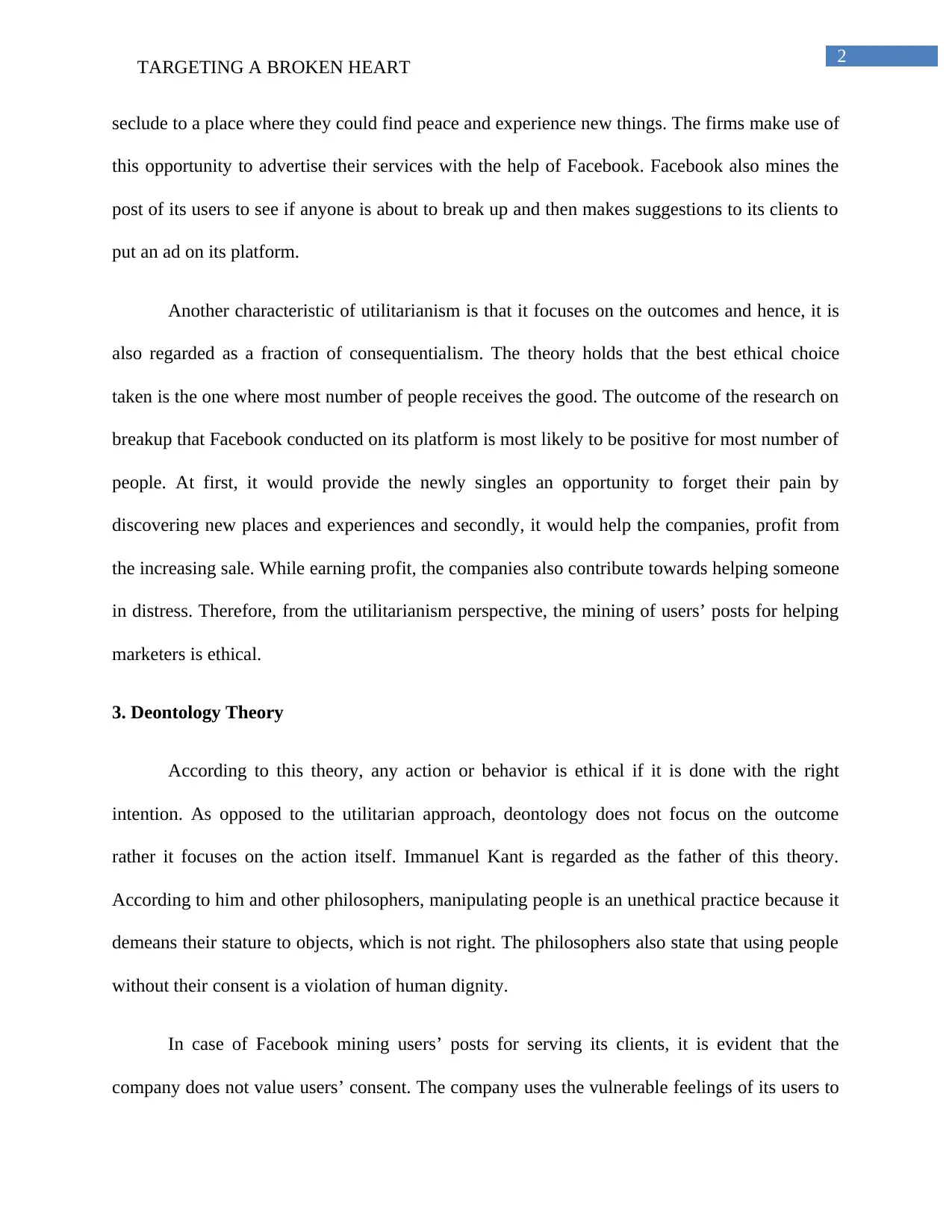
2
TARGETING A BROKEN HEART
seclude to a place where they could find peace and experience new things. The firms make use of
this opportunity to advertise their services with the help of Facebook. Facebook also mines the
post of its users to see if anyone is about to break up and then makes suggestions to its clients to
put an ad on its platform.
Another characteristic of utilitarianism is that it focuses on the outcomes and hence, it is
also regarded as a fraction of consequentialism. The theory holds that the best ethical choice
taken is the one where most number of people receives the good. The outcome of the research on
breakup that Facebook conducted on its platform is most likely to be positive for most number of
people. At first, it would provide the newly singles an opportunity to forget their pain by
discovering new places and experiences and secondly, it would help the companies, profit from
the increasing sale. While earning profit, the companies also contribute towards helping someone
in distress. Therefore, from the utilitarianism perspective, the mining of users’ posts for helping
marketers is ethical.
3. Deontology Theory
According to this theory, any action or behavior is ethical if it is done with the right
intention. As opposed to the utilitarian approach, deontology does not focus on the outcome
rather it focuses on the action itself. Immanuel Kant is regarded as the father of this theory.
According to him and other philosophers, manipulating people is an unethical practice because it
demeans their stature to objects, which is not right. The philosophers also state that using people
without their consent is a violation of human dignity.
In case of Facebook mining users’ posts for serving its clients, it is evident that the
company does not value users’ consent. The company uses the vulnerable feelings of its users to
TARGETING A BROKEN HEART
seclude to a place where they could find peace and experience new things. The firms make use of
this opportunity to advertise their services with the help of Facebook. Facebook also mines the
post of its users to see if anyone is about to break up and then makes suggestions to its clients to
put an ad on its platform.
Another characteristic of utilitarianism is that it focuses on the outcomes and hence, it is
also regarded as a fraction of consequentialism. The theory holds that the best ethical choice
taken is the one where most number of people receives the good. The outcome of the research on
breakup that Facebook conducted on its platform is most likely to be positive for most number of
people. At first, it would provide the newly singles an opportunity to forget their pain by
discovering new places and experiences and secondly, it would help the companies, profit from
the increasing sale. While earning profit, the companies also contribute towards helping someone
in distress. Therefore, from the utilitarianism perspective, the mining of users’ posts for helping
marketers is ethical.
3. Deontology Theory
According to this theory, any action or behavior is ethical if it is done with the right
intention. As opposed to the utilitarian approach, deontology does not focus on the outcome
rather it focuses on the action itself. Immanuel Kant is regarded as the father of this theory.
According to him and other philosophers, manipulating people is an unethical practice because it
demeans their stature to objects, which is not right. The philosophers also state that using people
without their consent is a violation of human dignity.
In case of Facebook mining users’ posts for serving its clients, it is evident that the
company does not value users’ consent. The company uses the vulnerable feelings of its users to
⊘ This is a preview!⊘
Do you want full access?
Subscribe today to unlock all pages.

Trusted by 1+ million students worldwide
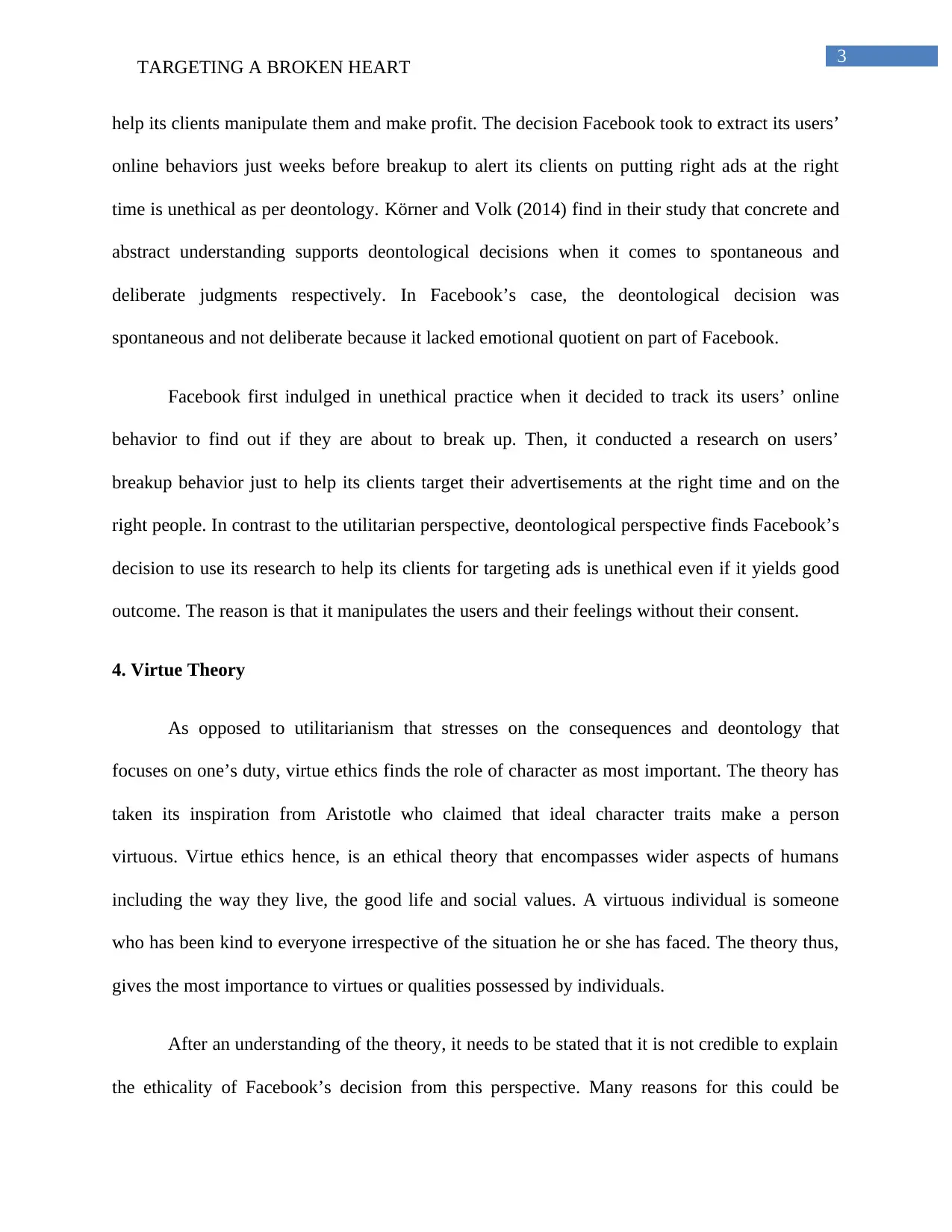
3
TARGETING A BROKEN HEART
help its clients manipulate them and make profit. The decision Facebook took to extract its users’
online behaviors just weeks before breakup to alert its clients on putting right ads at the right
time is unethical as per deontology. Körner and Volk (2014) find in their study that concrete and
abstract understanding supports deontological decisions when it comes to spontaneous and
deliberate judgments respectively. In Facebook’s case, the deontological decision was
spontaneous and not deliberate because it lacked emotional quotient on part of Facebook.
Facebook first indulged in unethical practice when it decided to track its users’ online
behavior to find out if they are about to break up. Then, it conducted a research on users’
breakup behavior just to help its clients target their advertisements at the right time and on the
right people. In contrast to the utilitarian perspective, deontological perspective finds Facebook’s
decision to use its research to help its clients for targeting ads is unethical even if it yields good
outcome. The reason is that it manipulates the users and their feelings without their consent.
4. Virtue Theory
As opposed to utilitarianism that stresses on the consequences and deontology that
focuses on one’s duty, virtue ethics finds the role of character as most important. The theory has
taken its inspiration from Aristotle who claimed that ideal character traits make a person
virtuous. Virtue ethics hence, is an ethical theory that encompasses wider aspects of humans
including the way they live, the good life and social values. A virtuous individual is someone
who has been kind to everyone irrespective of the situation he or she has faced. The theory thus,
gives the most importance to virtues or qualities possessed by individuals.
After an understanding of the theory, it needs to be stated that it is not credible to explain
the ethicality of Facebook’s decision from this perspective. Many reasons for this could be
TARGETING A BROKEN HEART
help its clients manipulate them and make profit. The decision Facebook took to extract its users’
online behaviors just weeks before breakup to alert its clients on putting right ads at the right
time is unethical as per deontology. Körner and Volk (2014) find in their study that concrete and
abstract understanding supports deontological decisions when it comes to spontaneous and
deliberate judgments respectively. In Facebook’s case, the deontological decision was
spontaneous and not deliberate because it lacked emotional quotient on part of Facebook.
Facebook first indulged in unethical practice when it decided to track its users’ online
behavior to find out if they are about to break up. Then, it conducted a research on users’
breakup behavior just to help its clients target their advertisements at the right time and on the
right people. In contrast to the utilitarian perspective, deontological perspective finds Facebook’s
decision to use its research to help its clients for targeting ads is unethical even if it yields good
outcome. The reason is that it manipulates the users and their feelings without their consent.
4. Virtue Theory
As opposed to utilitarianism that stresses on the consequences and deontology that
focuses on one’s duty, virtue ethics finds the role of character as most important. The theory has
taken its inspiration from Aristotle who claimed that ideal character traits make a person
virtuous. Virtue ethics hence, is an ethical theory that encompasses wider aspects of humans
including the way they live, the good life and social values. A virtuous individual is someone
who has been kind to everyone irrespective of the situation he or she has faced. The theory thus,
gives the most importance to virtues or qualities possessed by individuals.
After an understanding of the theory, it needs to be stated that it is not credible to explain
the ethicality of Facebook’s decision from this perspective. Many reasons for this could be
Paraphrase This Document
Need a fresh take? Get an instant paraphrase of this document with our AI Paraphraser
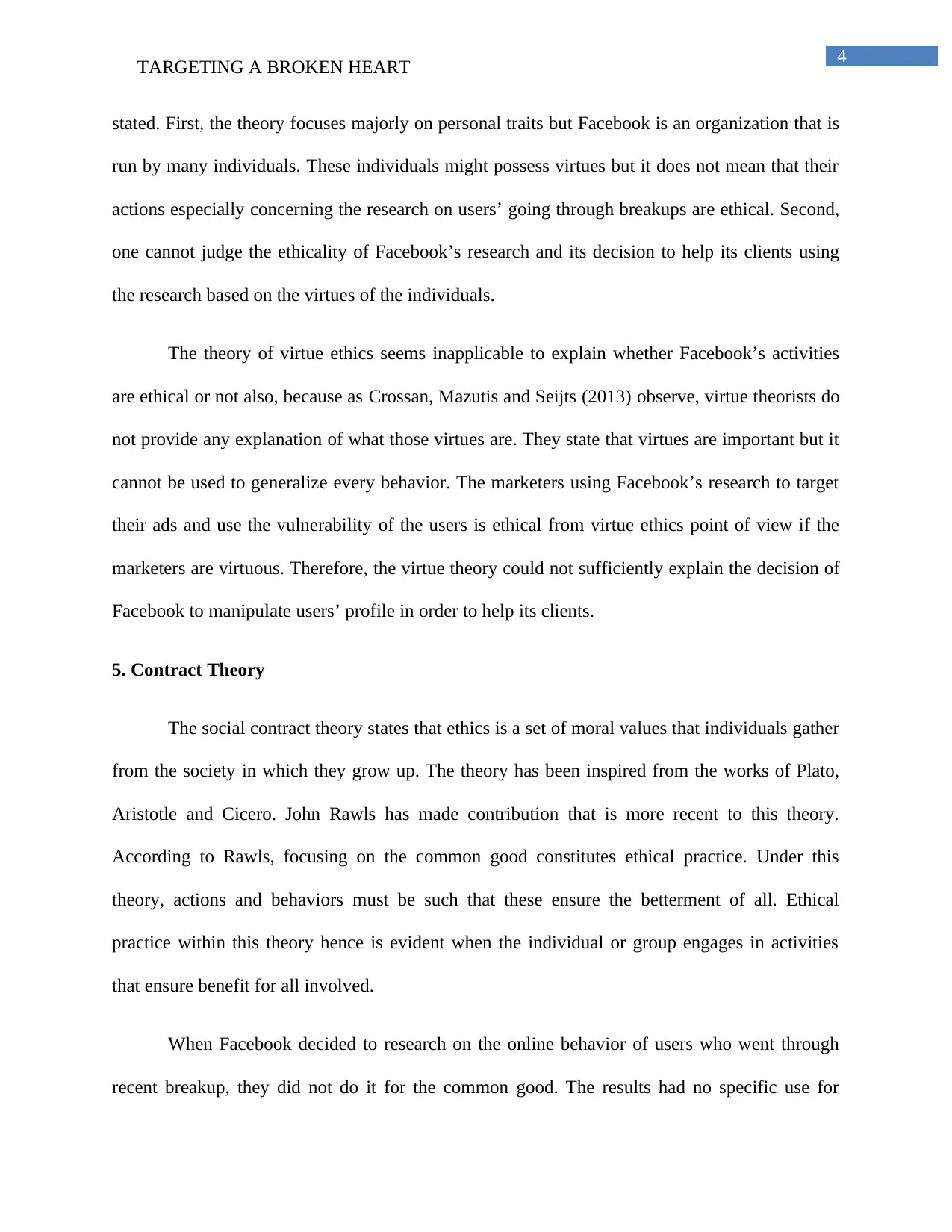
4
TARGETING A BROKEN HEART
stated. First, the theory focuses majorly on personal traits but Facebook is an organization that is
run by many individuals. These individuals might possess virtues but it does not mean that their
actions especially concerning the research on users’ going through breakups are ethical. Second,
one cannot judge the ethicality of Facebook’s research and its decision to help its clients using
the research based on the virtues of the individuals.
The theory of virtue ethics seems inapplicable to explain whether Facebook’s activities
are ethical or not also, because as Crossan, Mazutis and Seijts (2013) observe, virtue theorists do
not provide any explanation of what those virtues are. They state that virtues are important but it
cannot be used to generalize every behavior. The marketers using Facebook’s research to target
their ads and use the vulnerability of the users is ethical from virtue ethics point of view if the
marketers are virtuous. Therefore, the virtue theory could not sufficiently explain the decision of
Facebook to manipulate users’ profile in order to help its clients.
5. Contract Theory
The social contract theory states that ethics is a set of moral values that individuals gather
from the society in which they grow up. The theory has been inspired from the works of Plato,
Aristotle and Cicero. John Rawls has made contribution that is more recent to this theory.
According to Rawls, focusing on the common good constitutes ethical practice. Under this
theory, actions and behaviors must be such that these ensure the betterment of all. Ethical
practice within this theory hence is evident when the individual or group engages in activities
that ensure benefit for all involved.
When Facebook decided to research on the online behavior of users who went through
recent breakup, they did not do it for the common good. The results had no specific use for
TARGETING A BROKEN HEART
stated. First, the theory focuses majorly on personal traits but Facebook is an organization that is
run by many individuals. These individuals might possess virtues but it does not mean that their
actions especially concerning the research on users’ going through breakups are ethical. Second,
one cannot judge the ethicality of Facebook’s research and its decision to help its clients using
the research based on the virtues of the individuals.
The theory of virtue ethics seems inapplicable to explain whether Facebook’s activities
are ethical or not also, because as Crossan, Mazutis and Seijts (2013) observe, virtue theorists do
not provide any explanation of what those virtues are. They state that virtues are important but it
cannot be used to generalize every behavior. The marketers using Facebook’s research to target
their ads and use the vulnerability of the users is ethical from virtue ethics point of view if the
marketers are virtuous. Therefore, the virtue theory could not sufficiently explain the decision of
Facebook to manipulate users’ profile in order to help its clients.
5. Contract Theory
The social contract theory states that ethics is a set of moral values that individuals gather
from the society in which they grow up. The theory has been inspired from the works of Plato,
Aristotle and Cicero. John Rawls has made contribution that is more recent to this theory.
According to Rawls, focusing on the common good constitutes ethical practice. Under this
theory, actions and behaviors must be such that these ensure the betterment of all. Ethical
practice within this theory hence is evident when the individual or group engages in activities
that ensure benefit for all involved.
When Facebook decided to research on the online behavior of users who went through
recent breakup, they did not do it for the common good. The results had no specific use for
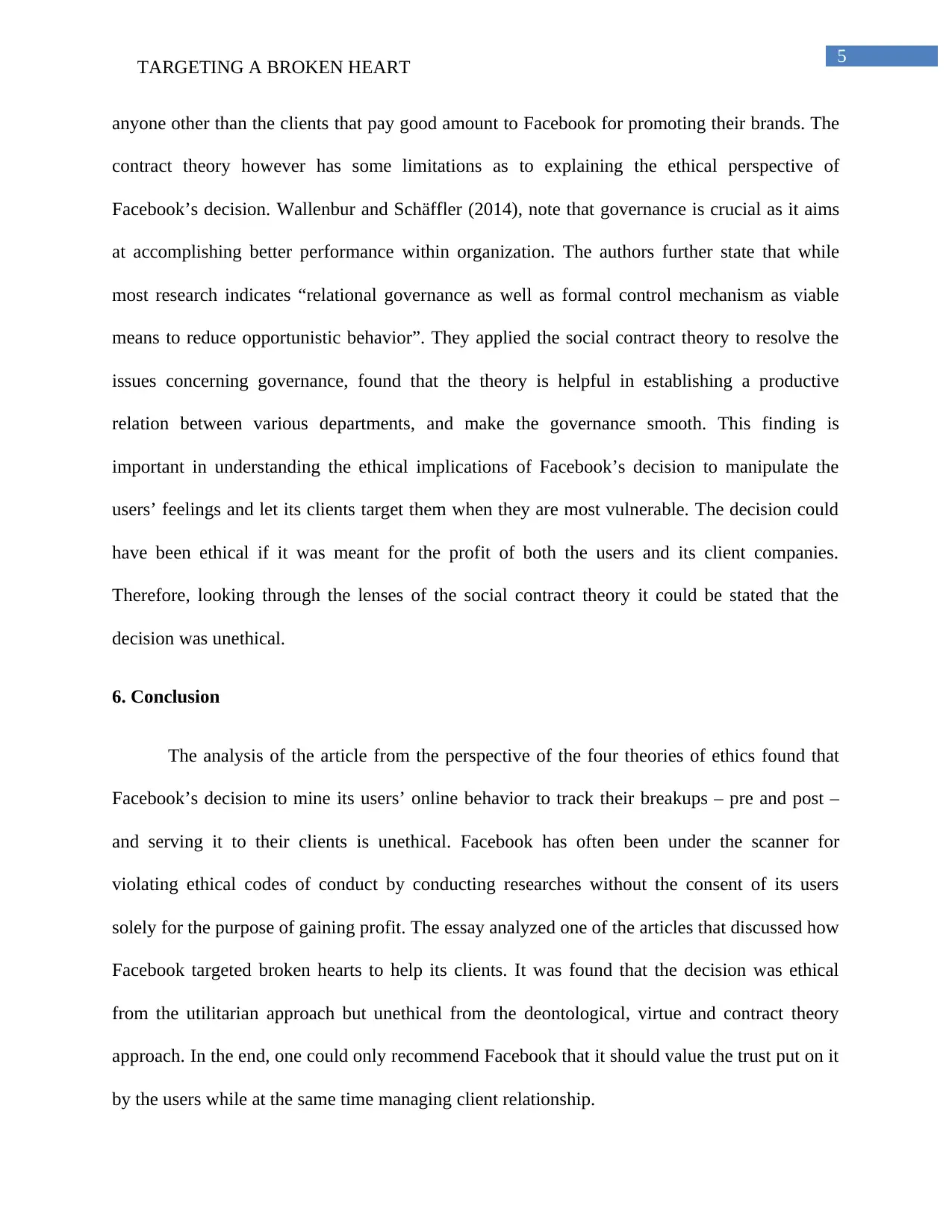
5
TARGETING A BROKEN HEART
anyone other than the clients that pay good amount to Facebook for promoting their brands. The
contract theory however has some limitations as to explaining the ethical perspective of
Facebook’s decision. Wallenbur and Schäffler (2014), note that governance is crucial as it aims
at accomplishing better performance within organization. The authors further state that while
most research indicates “relational governance as well as formal control mechanism as viable
means to reduce opportunistic behavior”. They applied the social contract theory to resolve the
issues concerning governance, found that the theory is helpful in establishing a productive
relation between various departments, and make the governance smooth. This finding is
important in understanding the ethical implications of Facebook’s decision to manipulate the
users’ feelings and let its clients target them when they are most vulnerable. The decision could
have been ethical if it was meant for the profit of both the users and its client companies.
Therefore, looking through the lenses of the social contract theory it could be stated that the
decision was unethical.
6. Conclusion
The analysis of the article from the perspective of the four theories of ethics found that
Facebook’s decision to mine its users’ online behavior to track their breakups – pre and post –
and serving it to their clients is unethical. Facebook has often been under the scanner for
violating ethical codes of conduct by conducting researches without the consent of its users
solely for the purpose of gaining profit. The essay analyzed one of the articles that discussed how
Facebook targeted broken hearts to help its clients. It was found that the decision was ethical
from the utilitarian approach but unethical from the deontological, virtue and contract theory
approach. In the end, one could only recommend Facebook that it should value the trust put on it
by the users while at the same time managing client relationship.
TARGETING A BROKEN HEART
anyone other than the clients that pay good amount to Facebook for promoting their brands. The
contract theory however has some limitations as to explaining the ethical perspective of
Facebook’s decision. Wallenbur and Schäffler (2014), note that governance is crucial as it aims
at accomplishing better performance within organization. The authors further state that while
most research indicates “relational governance as well as formal control mechanism as viable
means to reduce opportunistic behavior”. They applied the social contract theory to resolve the
issues concerning governance, found that the theory is helpful in establishing a productive
relation between various departments, and make the governance smooth. This finding is
important in understanding the ethical implications of Facebook’s decision to manipulate the
users’ feelings and let its clients target them when they are most vulnerable. The decision could
have been ethical if it was meant for the profit of both the users and its client companies.
Therefore, looking through the lenses of the social contract theory it could be stated that the
decision was unethical.
6. Conclusion
The analysis of the article from the perspective of the four theories of ethics found that
Facebook’s decision to mine its users’ online behavior to track their breakups – pre and post –
and serving it to their clients is unethical. Facebook has often been under the scanner for
violating ethical codes of conduct by conducting researches without the consent of its users
solely for the purpose of gaining profit. The essay analyzed one of the articles that discussed how
Facebook targeted broken hearts to help its clients. It was found that the decision was ethical
from the utilitarian approach but unethical from the deontological, virtue and contract theory
approach. In the end, one could only recommend Facebook that it should value the trust put on it
by the users while at the same time managing client relationship.
⊘ This is a preview!⊘
Do you want full access?
Subscribe today to unlock all pages.

Trusted by 1+ million students worldwide
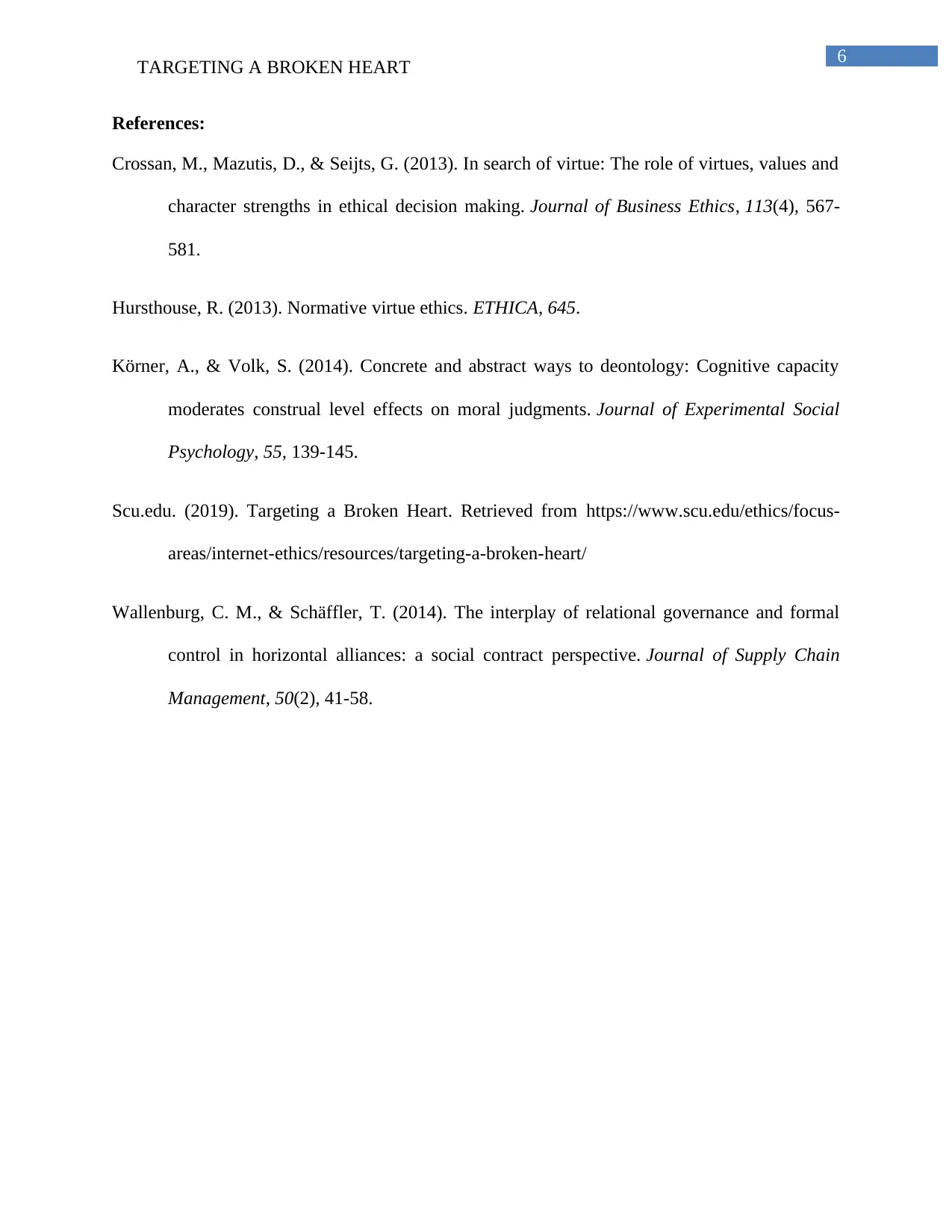
6
TARGETING A BROKEN HEART
References:
Crossan, M., Mazutis, D., & Seijts, G. (2013). In search of virtue: The role of virtues, values and
character strengths in ethical decision making. Journal of Business Ethics, 113(4), 567-
581.
Hursthouse, R. (2013). Normative virtue ethics. ETHICA, 645.
Körner, A., & Volk, S. (2014). Concrete and abstract ways to deontology: Cognitive capacity
moderates construal level effects on moral judgments. Journal of Experimental Social
Psychology, 55, 139-145.
Scu.edu. (2019). Targeting a Broken Heart. Retrieved from https://www.scu.edu/ethics/focus-
areas/internet-ethics/resources/targeting-a-broken-heart/
Wallenburg, C. M., & Schäffler, T. (2014). The interplay of relational governance and formal
control in horizontal alliances: a social contract perspective. Journal of Supply Chain
Management, 50(2), 41-58.
TARGETING A BROKEN HEART
References:
Crossan, M., Mazutis, D., & Seijts, G. (2013). In search of virtue: The role of virtues, values and
character strengths in ethical decision making. Journal of Business Ethics, 113(4), 567-
581.
Hursthouse, R. (2013). Normative virtue ethics. ETHICA, 645.
Körner, A., & Volk, S. (2014). Concrete and abstract ways to deontology: Cognitive capacity
moderates construal level effects on moral judgments. Journal of Experimental Social
Psychology, 55, 139-145.
Scu.edu. (2019). Targeting a Broken Heart. Retrieved from https://www.scu.edu/ethics/focus-
areas/internet-ethics/resources/targeting-a-broken-heart/
Wallenburg, C. M., & Schäffler, T. (2014). The interplay of relational governance and formal
control in horizontal alliances: a social contract perspective. Journal of Supply Chain
Management, 50(2), 41-58.
1 out of 7
Related Documents
Your All-in-One AI-Powered Toolkit for Academic Success.
+13062052269
info@desklib.com
Available 24*7 on WhatsApp / Email
![[object Object]](/_next/static/media/star-bottom.7253800d.svg)
Unlock your academic potential
Copyright © 2020–2026 A2Z Services. All Rights Reserved. Developed and managed by ZUCOL.




